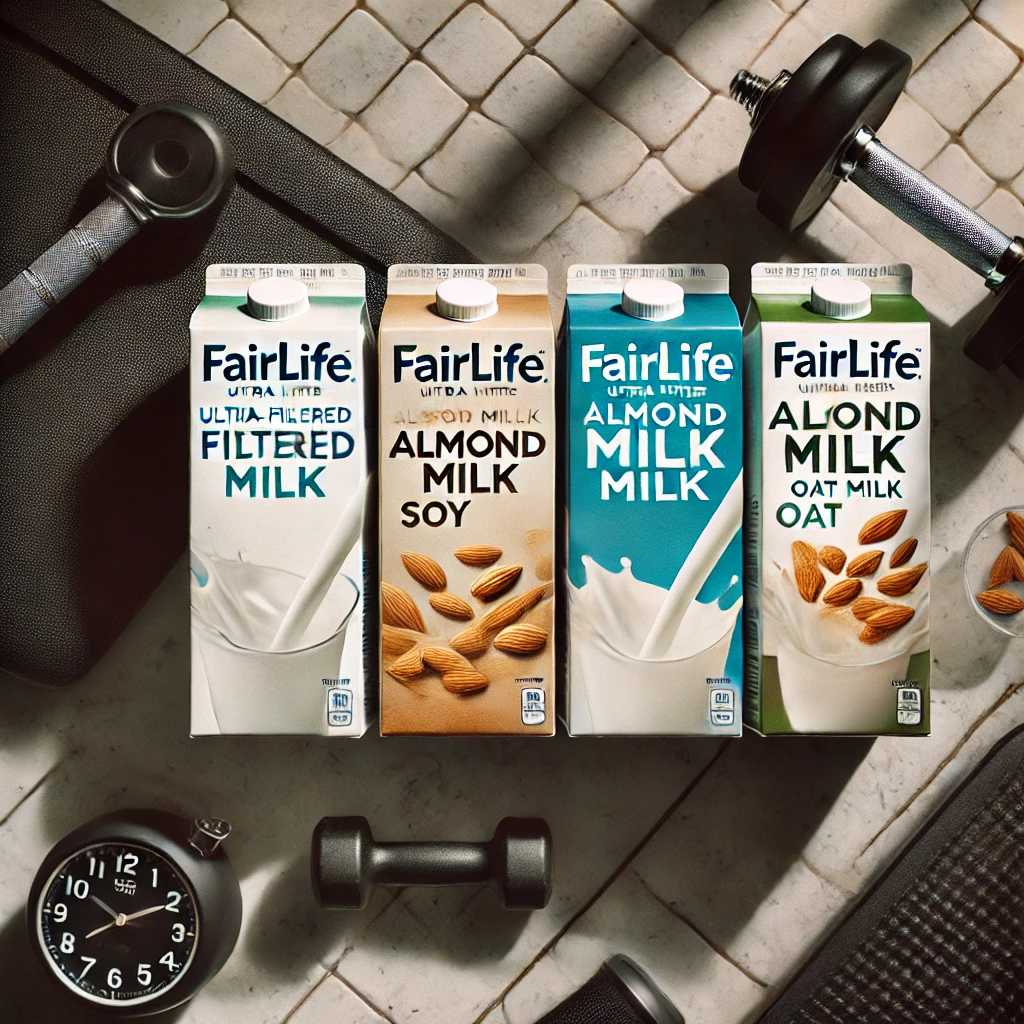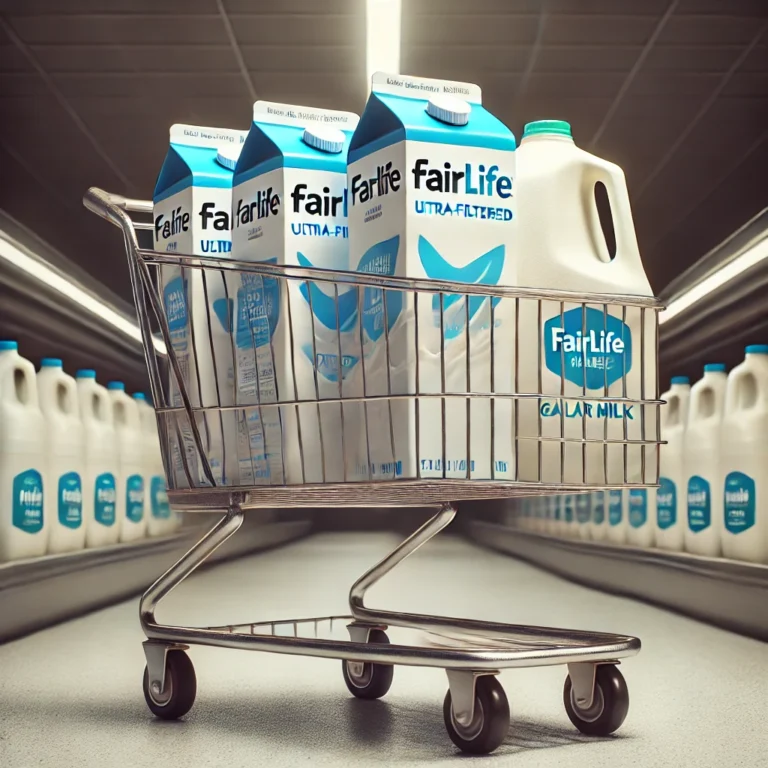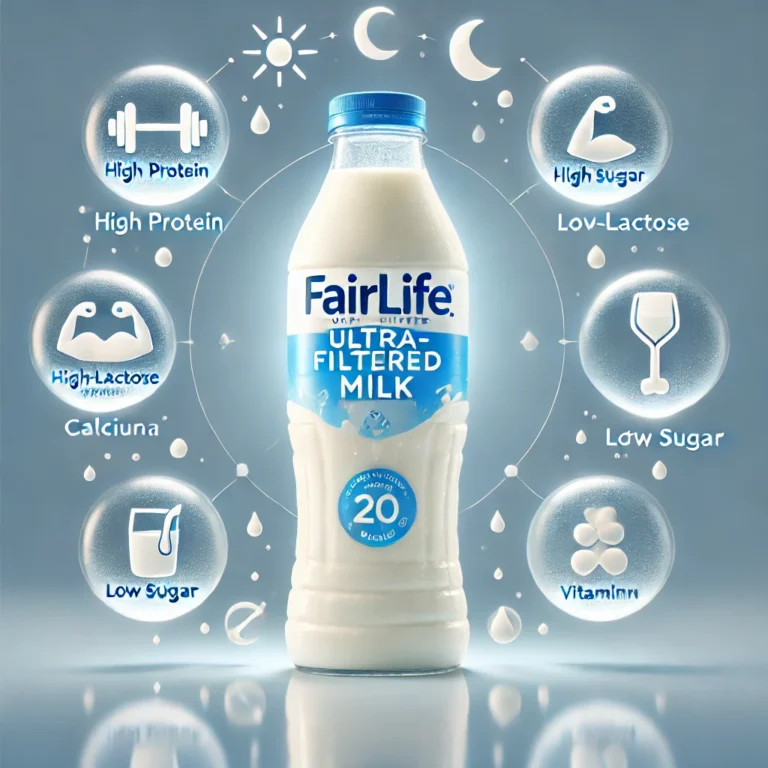
Comparing Fairlife, soy, almond, and oat milk for optimized fitness nutrition.
Introduction: Choosing the Best Lactose-Free Milk for Athletes
Milk offers essential nutrients for muscle recovery, but lactose intolerance can limit dairy consumption. Fairlife Ultra-Filtered Milk offers a high-protein, lactose-free option, while plant-based milks such as soy, almond, and oat milkcater to those with dietary preferences. This article compares these options to determine which is best for athletes seeking muscle recovery, fitness performance, and cost-efficiency.
1. Nutritional and Cost Comparison: Fairlife vs. Plant-Based Milks
| Milk Type | Calories (1 cup) | Protein (1 cup) | Carbs (1 cup) | Fat (1 cup) | Calcium (%DV) | Vitamin D (%DV) | Estimated Cost per Gallon | Lactose-Free |
|---|---|---|---|---|---|---|---|---|
| Fairlife Ultra-Filtered | 120 | 13g | 6g | 4.5g | 30% | 25% | $12.38 – $15.12 | Yes |
| Soy Milk | 80 | 7g | 4g | 4g | 18% | 10% | $3.99 – $6.49 | Yes |
| Almond Milk | 30-60 | 1g | 1-7g | 3g | 30% | 10% | $3.99 – $5.49 | Yes |
| Oat Milk | 90-120 | 2-4g | 16g | 5g | 25% | 20% | $4.49 – $6.99 | Yes |
2. Why Fairlife Stands Out for Muscle Recovery
Protein Efficiency: Fairlife’s 13 grams of protein per cup provides nearly double the amount in soy milk and far exceeds almond and oat milk. This makes it the most effective option for muscle repair and lean muscle gain【162】【163】.
Calcium and Vitamin D Benefits: Fairlife and almond milk both provide 30% of the daily value for calcium, but Fairlife’s 25% DV for vitamin D supports better bone strength and muscle function. This is particularly valuable for athletes focused on long-term fitness【163】.
Lower Carbohydrate Intake: Fairlife’s 6g of carbs per cup makes it suitable for those managing carbs, while oat milk serves endurance athletes needing higher carbs for glycogen replenishment【172】.
3. Taste, Digestion, and Practicality for Fitness Enthusiasts
- Taste and Texture: Fairlife’s flavor closely resembles traditional milk, making it a preferred choice over the thinner consistency of soy or oat milk.
- Digestibility: All the options are lactose-free, but athletes with soy allergies or gluten sensitivity may need to avoid soy or oat milk, respectively【163】.
- Cost vs. Value: While Fairlife costs more, it offers superior protein and nutrient density, making it a valuable investment for those focused on recovery and performance.
4. Protein Quality and Satiety: Making the Most of Every Cup
Bioavailability: Milk proteins (whey and casein) found in Fairlife are more bioavailable than plant-based proteins, meaning the body absorbs and uses these proteins more efficiently【172】.
- Analogy: Think of Fairlife’s protein as premium-grade fuel—it powers your body with minimal waste, while plant-based proteins provide lower efficiency.
- Satiety: Fairlife’s protein and fat promote a longer-lasting feeling of fullness, making it useful for weight management compared to the lower-calorie alternatives like almond milk【172】.
5. The Environmental Impact: A Balanced Approach
Plant-based options like oat and almond milk have lower carbon footprints compared to dairy. However, Fairlife’s filtration process reduces the environmental burden of traditional dairy farming, making it a more sustainable dairy option【172】. Athletes seeking balance between nutrition and sustainability may choose to alternate between Fairlife and plant-based options to meet their goals.
Conclusion: Fairlife Milk Wins for Fitness Performance
For athletes and fitness enthusiasts aiming to maximize muscle recovery and maintain optimal nutrition, Fairlife Ultra-Filtered Milk is the superior lactose-free option. It offers high protein, essential vitamins, and manageable carbs, making it the best fit for performance-driven diets. While soy milk provides a reasonable plant-based alternative, almond and oat milks are better for hydration or snacks rather than heavy fitness support.
Internal Linking Recommendation
- The Economics of Milk for Fitness – Cost per Liter and Daily Consumption“Curious how Fairlife compares to regular milk? Check out our in-depth cost analysis.”
Sources
- International Society of Sports Nutrition: Protein for Muscle Recovery【139】
- Ochsner Health: Milk and Plant-Based Alternatives【163】
- Nutritionix: Fairlife Milk【83】


